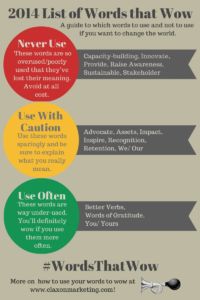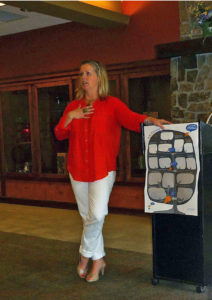 When we released the 2014 List of Words that Wow infographic, we promised to explain why each word was on there. So here we go…first up, those in the “Never Use” category.
When we released the 2014 List of Words that Wow infographic, we promised to explain why each word was on there. So here we go…first up, those in the “Never Use” category.
Some of these words are likely near and dear to your heart. Will it be tough to not use them? Yes.Will it be worth it? Yes.
Capacity-building: Not only does it sound painful to build capacity, it’s unclear what’s better in the world if you do end up with more capacity. Can you feed more families? Will more trees be protected? Will kids be better at math or science or reading or the arts? You build capacity SO THAT something else is possible. In the near term, that something else is often something like sturdier databases, or more functional space, or better trained staff. Sexy stuff. (Not!) It’s what those things make possible that’s compelling. Not the capacity to do it.
A note on that special category of organizations we affectionately call “capacity builders“: We love you. You do the un-glamorous work of making it possible for other organizations to do what they do faster, better, more efficiently, more effectively, more awesomely. You have the tough task of making that work sound compelling. And, to the un-initiated, it’s not immediately obvious why this work is compelling. For most of you, what’s compelling isn’t your ‘what’ (e.g. building websites or revving up volunteer programs), it’s your ‘why’. Even if eventually you get into the weeds of what you do and how you do it, frame that up by talking about why the work is important as it relates the organizations you work with. Talk about their mission and how your work fits into it. Then go into the specifics of the work itself. And when you’re hanging out with other capacity-builders, go again and use the jargon-y term ‘capacity-builders’. Heck, you might even want to have a secret hand shake (or maybe you already do). But when other people are around, stop it. Simply say, “We work with nonprofits so they can do what they do more efficiently and effectively. We do that by…'”
Innovate: “To innovate” means to make new. It does not mean ‘make better’ or ‘spiffy’ or ‘kinda sorta different than everyone else’. It means new. Totally new. The rampant use of the words ‘innovate’ and ‘innovative’ would lead one to believe that there’s a whole lot of new-ness being generated by nonprofits. Here’s the thing–it’s used so much that no one really believes you. Everyone is innovative these days. Unless you can prove it, don’t say it. Instead, speak directly to what makes what you’re doing compelling, interesting, awe-inspiring. Is it how you care for your patients? Is it the types of plays you put on? Is it the method you created to teach kids how to learn outdoors? Explain how you’re making the world a better place, not a new place.
Provide: Yes, I’m still on this soapbox. I may never get off it. Verbs are action words. They are the super heroes of every sentence. There are a whole bunch to chose from. You can do better. I know you can.
Raise awareness: Raising awareness is a means to an end. You raise awareness SO THAT something else happens. So that you’ll have more volunteers. So that you’re current donors will give to you again. So that you have more people take advantage of your programs. And you’re doing all that SO THAT you can deliver on your mission. Now some folks will say that if you’re doing a public awareness campaign–like not texting while driving–your objective really is to simply raise awareness. Not true. In those instances, you’re raising awareness SO THAT people will stop idiotically texting while driving. The next time someone busts out with “Our goal this year should be to raise awareness about our organization,” tell them to talk to the hand. Okay, don’t say that. But do ask what will be better for your organization–and eventually the world–if you do successfully raise awareness. What then? (If you want to make your awareness-raising efforts worthwhile, check out Kivi Leroux Miller’s upcoming webinar. She always rocks it.)
Sustainable: This word is used in two ways: 1) Being able to get by on your own with little to no outside assistance, e.g. not needing donations, and 2) being able to exist in perpetuity, e.g. not sucking the earth dry of all its natural resources so there’s nothing left for future generations. Unless you have earned income streams that mean you don’t need philanthropic donations, you’re always going to need donors. That is, by definition, part of the plan. You don’t want to be independent of them. When organizations say they’re “sustainable”, what they’re generally trying to say is, “We’re smart about how we run this organization so you should feel good about giving us your hard earned Benjamins because we’ll use them wisely.” So say that, or something along those lines.
In terms of the second usage, environmental organizations have been transitioning to ‘sustainability’ for quite some time. And it makes sense. But now it’s so over-used that it’s lost meaning. Getting more specific helps. In what way are you making it possible for the planet and its people to stick around for the long haul? Answer that question and you generally land on something that’s more compelling.
Stakeholder: Stakeholder sounds clinical. Standoff-ish. It sounds like you’d never want to be in the same room with this person, let alone have a chat about how important they are to your mission. People support you because they believe in what you do. Show them some respect, already! They are your fans, your supporters, your donors, your volunteers, your clients, your patients, your partners in making the world a better place! Not some name-less, face-less stakeholder. Sheesh.
Which of these words will you stop using? Which words would you add to the list?

 I would maintain that thanks are the highest form of thought; and that gratitude is happiness doubled by wonder. ~G.K. Chesterton
I would maintain that thanks are the highest form of thought; and that gratitude is happiness doubled by wonder. ~G.K. Chesterton